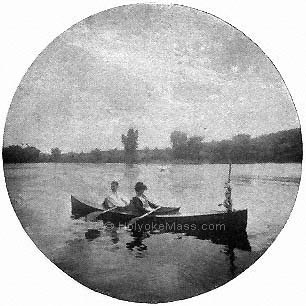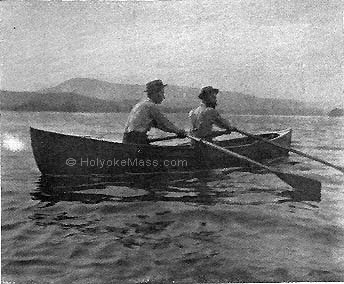On the day of the races the river about Smith’s Ferry is a lively place. It is a gala day at the lodge and the canoeist’s hospitality is taxed to its utmost to care for their numerous friends who resort to the spot. It is to be supposed, too, that the ferryman, up above, reaps a golden harvest in carrying the crowds across from the railroad station to the South Hadley side, where a coach is ready to convey them down to the lodge.

Down Stream.
|
The races have their interests, but they are not so picturesque as some of the adventures on the river which have fewer witnesses. We pick out for record an instance or two of this sort. The canoeists have a liking for going by railroad to Greenfield, and there making a transfer of their canoes from the baggage car to the little Deerfield river, thence to paddle out on the broad Connecticut and spend a day going downstream to Holyoke. On one such occasion four young men left Greenfield behind them, and with sails set went scudding along with the current before a brisk north wind. It was a cold spring morning, and before they had gone many miles the wind had become a perfect gale and the water was broken with whitecaps. The two canoes kept out of the heaviest of the storm by keeping in the canoe in the lee of the shores, and as they approached Sunderland bridge, they slipped in behind a little island. One canoe was leading the other by several rods. The canoe in the rear, when it came from behind the island, out of comparative calm, was struck sharply by the full force of the gale and went over like a flash, and its occupants were plunged into the icy water. Their cries were heard by the first boat, which as hastily as could be took in sail and paddled to the rescue.

A Double Canoe.
|
A canoe is rather a ticklish craft for this sort of work, and a mud scow would be much preferable. You can’t take on extra passengers, and a little excitement easily topples the boat over. One of the fellows in the water clambered in to the overturned canoe and his companion still in the water clung to its slippery bottom. The other boat circled around, with a care not to get capsized itself, till it got hold of the painter, when it started shoreward. It was no small task to tow that overturned canoe, with its clinging freight, and its sail set under water. After a little the man in the water said he was about worn out, and could hold on but little longer. Thereupon one of those in the first boat dropped his paddle, leaped into the river and went to his help. Things looked decidedly serious, but inch by inch the boats neared the bank, and at last they touched shore. All were pretty well exhausted, and it was a sorry looking company which waded from the choppy waves of the cold water and crawled up the bank. A friendly farmhouse was close by, and thither the canoeists wended their line of march. There they found an ancient farmer who welcomed them to a hospitable fire and regaled them on milk and doughnuts.
|